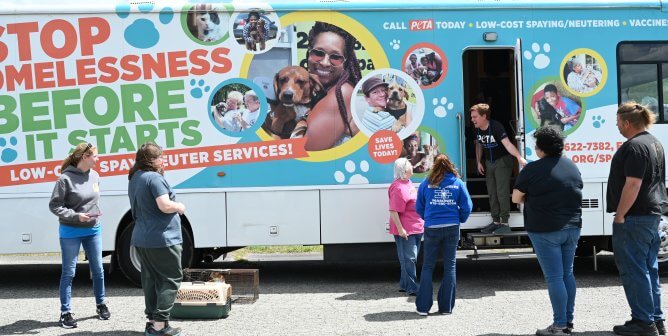Dogs are a part of our families, so of course many of us want to take them along on vacations. Tens of millions of animals make journeys with their guardians within the United States every year. Vacation packages are being designed around animals and their guardians, and sales of items such as canine backpacks are soaring. Some major hotel chains have changed their attitudes toward animals and now welcome them. The American Automobile Association (AAA) says that the number of lodgings accepting companion animals in the United States surpasses 12,000.
Check out PETA’s list of animal-friendly hotels, emergency vets, campgrounds, beaches, and other places, as well as a list of helpful books.
TripAdvisor‘s website offers a helpful social platform for travelers, packed with posts to assist you with planning the perfect trip. For animal-friendly advice, be sure to follow PETA!
Should You Take Your Dog Along?
Staying home is a must for sick, injured, or pregnant animals.
If dogs suffer from motion sickness, get over-stimulated easily, or get physically or emotionally upset when their routines are disrupted, the best option for them may be to stay home. This is especially true if your trip is a relatively quick one.
Will the trip be fun from your dog’s point of view, or will he or she be cooped up in a hotel room while you’re sunning on the beach or riding roller coasters?
Leave dogs where they are most comfortable, such as curled up on the couch or in the care of a trusted sitter, relative, close friend, coworker, or neighbor. It’s best to stick with adults because even well-intentioned youngsters can forget to come by when they are supposed to.
Find the perfect animal companion sitter.
If you think that your dog would have a grand time with you but are worried about his or her lack of manners, brush up on training. Untrained dogs are frequently punished for their “improper” behavior and are restrained so that they don’t “get into trouble.” PETA supports humane, interactive training, which gives dogs greater freedom and a better understanding of our world. But you should be the only one who trains your dog—not only does turning him or her over to someone else for training invite unseen abuse, it also fails to teach you how to communicate effectively.
Preparing for Your Trip
Research rules and policies regarding animals, such as quarantine laws and transportation restrictions. Double-check that the hotel or other location where you’ll be staying is prepared to welcome your animal with open arms.
Consider having your animal microchipped by your veterinarian. This is a painless process in which a microchip containing all identification information is inserted under the animal’s skin.
Get a vet checkup. Have your vet issue a health certificate stating that your animal is healthy and able to travel and that all necessary vaccinations (recommendations and requirements change frequently) are up to date.
FurHaven has unique companion-animal travel gear to help ensure that your dog will be happy and safe while traveling across town or across the country.
On the Road
Although driving is less risky for companion animals than flying is, there are, of course, some precautions to take:
- Never leave your pooch alone in the car: Dogs can suffer and die when left inside parked cars, even on mildly warm days. On a 78°F day, the temperature inside a shaded car is 90°F, and the inside of a car parked in the sun can reach 160°F in minutes. Animals can succumb to heatstroke within just 15 minutes.
- To prevent sickness, feed dogs early so that they don’t eat in the few hours before departure. Exercise them several hours before you depart so that they aren’t hot and thirsty in the car or forced to “hold it” for hours after gulping down water after a walk.
- Don’t carry your dog in the bed of a pickup truck. All it takes is one abrupt stop for them to be propelled into the street; plus, heat brings the added danger that they might burn their feet on the hot metal.
- Carry water and ice in containers for rest stops. No-spill travel bowls are available in pet supply stores and online.
- For dogs who are prone to car sickness, consult your veterinarian for remedies or try ginger capsules, available at health-food stores.
- Use a kennel or restrain your dog with a canine seat belt, available from pet supply stores and catalogs.
- Never open a car window or door when your dog is unrestrained. Countless dogs have been lost at tollbooths and rest stops this way.
- Stop to walk dogs often.
- Use a window shade for the back and side windows.
- Make sure that your air conditioning is working properly, and use it while driving.
- Don’t let your dog hang his or her head out the window. The BreezeGuard, by MuttManagers, LLC, is a powder-coated, welded steel mesh enclosure that is custom-fit into a fully opened vehicle passenger window. It comes with a protective shield that restricts the amount of breeze allowed on dogs’ eyes.
Pooches and Planes Don’t Mix
Although flying might sometimes seem to be the fastest and least stressful way to go, it can be the opposite for a dog forced to fly in the cargo hold. The only time a dog (or any animal) should be placed on a plane is if you’re relocating and all other options are unavailable. If you have no choice (and we truly mean absolutely no choice, because transporting your companion animal in the cargo area is dangerous, terrifying, and potentially deadly), please follow the guidelines on this PETA factsheet.
Now That You’re There
Dogs thrive on healthy routines. This doesn’t change just because you’re away from home. Provide regular walks, playtime, access to fresh water at all times, and food, preferably the kind they eat at home (if you need to switch, do it gradually to avoid upsetting your dog’s stomach). Wash bowls with soap and warm water daily.
Help show that dogs make good guests by being one yourself. Follow leash laws. If your dog barks a lot, don’t leave him or her alone in a hotel room (if you do leave your dog in the room, for safety reasons, let the front desk know).
Illness or Injury
The American Animal Hospital Association (1-800-883-6301) can refer you to a local veterinarian. (Note: PETA does not endorse veterinarians on the list).
Better yet, be prepared by asking your dog’s veterinarian for a reference in that area before you go. Print a map from the Internet and take it on your trip so you can get there quickly in the event of an emergency.
Boat Safety
Don’t forget to put a flotation vest on your dog. Although dogs are natural swimmers, they can tire easily and may drown. Flotation vests are especially important for dogs who are prone to seizures and other medical problems or who are new to boating.






